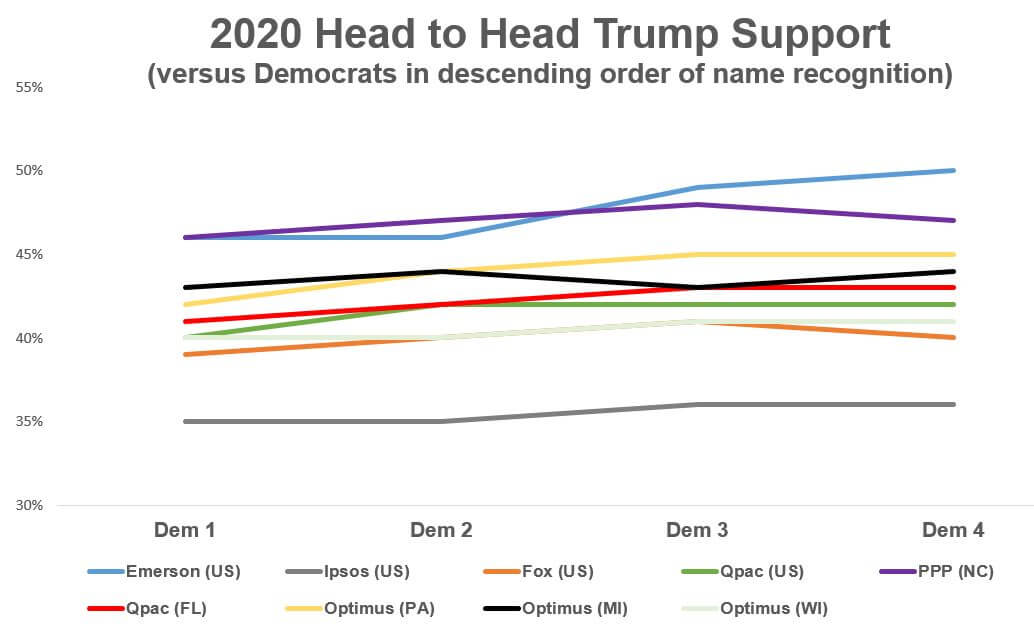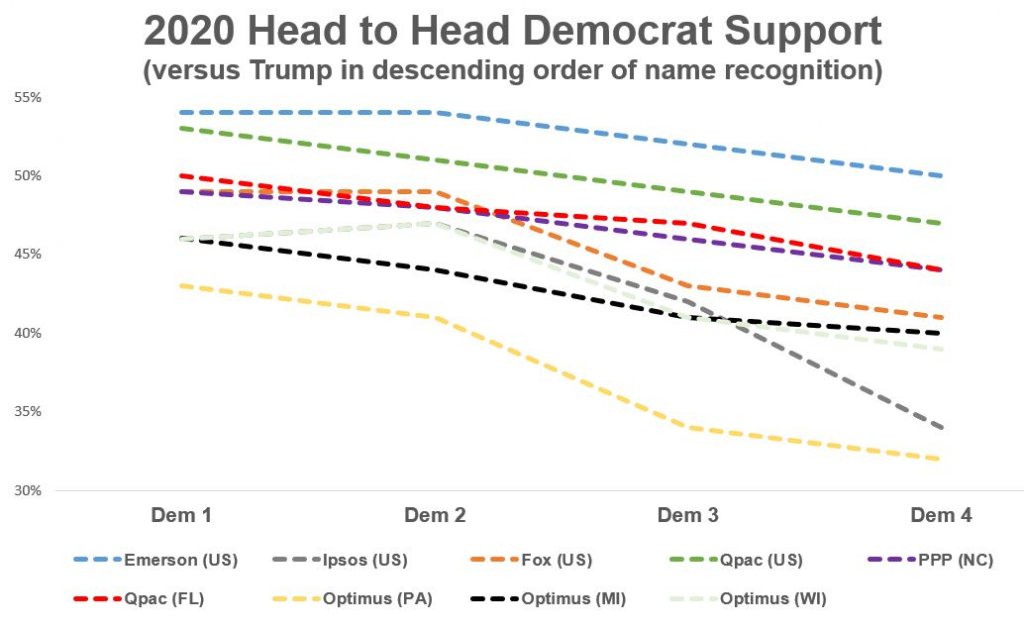Hypothetical general election match-ups don’t mean all that much… yet
By Patrick Murray
I was watching a news channel the other day when the resident pundit opined that polls show Joe Biden to be the most formidable Democrat against Donald Trump. “No! They do not. Stop saying that,” I shouted into the void.
There is a great deal of nuance in what these current polls really mean versus how they are breathlessly characterized in the 24-hour media environment. The main caveat for all 2020 polling is that the campaign really hasn’t started as far as the vast majority of voters are concerned. They simply are not paying enough attention right now to offer carefully considered opinions. We pretty much say this every time we release a poll, but journalists and pundits who eat, sleep and breathe the election find it difficult to put themselves in the shoes of a typical voter for whom this is still just background noise.
Even though interest in the upcoming election is astronomically high, it’s not clear that voters are keeping up with the details yet. A recent Quinnipiac Poll found that 42% of voters nationwide are currently paying a lot of attention to the 2020 campaign, which includes 48% of Republicans, 45% of Democrats, and 36% of independents. In other words, the majority of voters are really not tuned in.
To be sure, voters will talk about politics when you ask them – in a poll or in the ubiquitous Iowa diner – but their opinions at the stage of the race tend to be rather inchoate. In fact, one candidate probably owes his spot on the debate stage this week due mainly to the way his name was introduced in a poll of Democratic voters who had previously known nothing about him.
A recent Monmouth University Poll in Nevada bears this out as well. Likely caucusgoers make up less than one-tenth of all registered voters in the state, so it’s fair to assume they would be among the most highly engaged. Of 24 Democratic candidates in the field, only three (Biden, Bernie Sanders, and Elizabeth Warren) had nearly universal name recognition and only ten candidates were sufficiently well known to get a majority of these highly engaged voters to provide an opinion of them.
Moreover, political “moderates” in this pool of likely Democratic caucusgoers were even less likely to have opinions of the top ten candidates – to the tune of about 7 points less likely on average. It’s no surprise that moderate voters are currently much more likely than liberals to throw their support to Biden. It’s not just about ideology. He’s the one candidate they actually know something about, whereas liberal voters tend to be more familiar with many of the other candidates.
You have to be especially careful when looking at polls of potential general election match-ups. The graph below shows Trump’s support in head-to-head contests against four possible Democratic nominees according to nine recent polls. Across each of these polls, Trump’s numbers barely budge in any of these contests because voters are confident in their knowledge of him.

Now, take a look at the same graph, but this time showing the four Democrats’ support against Trump. The graph is ordered based on name recognition, starting on the left with Biden, then Sanders and Warren, with Pete Buttigieg at the end. There is almost a straight diagonal line in voter support from the best-known candidate to the least-known in each poll.

Name recognition plays a significant role in whether voters are ready to say they will support a specific Democrat against Trump, but it does not impact how many voters say they will back the incumbent in any of these four scenarios. These graphs also illustrate why you’re probably better off just using a simple “Trump reelection support” question at this stage of the race rather than any hypothetical head-to-head polls.
Voter engagement and candidate familiarity matters and will certainly change. This is important to keep in mind not only for lower-tier candidates who could eventually emerge as top contenders, but also for support of the supposed front-runner as well. Even though Biden already has universal name recognition, it does not mean that opinions of him are set in stone. The campaign will matter. The “Joe Biden” whom voters know today – or think they know today – will not be the same candidate they are evaluating in the throes of a competitive nomination battle five or six months from now.
The bottom line is that most Democratic voters will not really tune into this race until the fall. This week’s debates will be a step toward introducing them to a field of candidates they barely know. Of course, it goes without saying that pundits will seek to immediately declare whose campaign is sunk and who is inexorably on the rise because of their debate performances. But as far as most voters are concerned, this will be a first look – and for many just a fleeting glance – at a race that still has many laps to go.
****************************************
